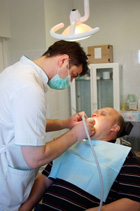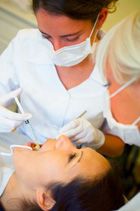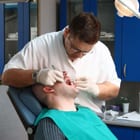 The clean feeling you get after you have been to the dentist is hard to beat and almost impossible to recreate at home, no matter how hard you try to clean your teeth. That is because dentists are experts and able to use special tools and techniques to get your teeth as clean as they can possibly be. This will almost always involve techniques called scaling and polishing.
The clean feeling you get after you have been to the dentist is hard to beat and almost impossible to recreate at home, no matter how hard you try to clean your teeth. That is because dentists are experts and able to use special tools and techniques to get your teeth as clean as they can possibly be. This will almost always involve techniques called scaling and polishing.
Scaling is the process of using a small, sharpened hook to scrape the plaque and tartar away from the surface of the teeth. Plaque builds up around the surface enamel of the teeth and causes erosion, which leads to cavities, the main cause of tooth decay and infection. Plaque can be removed at home with brushing and flossing but if allowed to remain will eventually become tartar. This is an ugly yellow-brown substance that discolours the teeth and also continues to erode the enamel. Tartar can be removed by scaling, which not only returns the teeth to a whiter, more natural and healthy colour, but also protects them against further damage from erosion. The dentist or hygienist will carefully scale all the areas of the teeth, removing built up plaque and tartar by scraping it loose. This may sound a lot more unpleasant than it actually is and is in fact an almost completely painless procedure.
After the teeth have been fully scaled they can then be polished. This involves buffing the surface of the teeth with an electric cleaner. This not only makes the teeth look much better, but also leaves them very smooth and more difficult for plaque to cling to. This can be carried out as a one off procedure or part of a wider smile makeover. Ask your Central Leeds dentist for more information about scaling and polishing.





 Many smokers need to be made more aware of the risks that they are putting themselves under. In a recent study by the Journal of the American Medical Association it as found that only a third of smokers considered themselves to be at a greater risk of heart disease than non-smokers. Whether they are just tuned out to the dangers or completely ignorant is unclear, but they are also placing themselves at risk of many other health complications.
Many smokers need to be made more aware of the risks that they are putting themselves under. In a recent study by the Journal of the American Medical Association it as found that only a third of smokers considered themselves to be at a greater risk of heart disease than non-smokers. Whether they are just tuned out to the dangers or completely ignorant is unclear, but they are also placing themselves at risk of many other health complications. There is no feeling quite as clean as that of just having had your teeth cleaned by a dentist or dental hygienist. No mater how thoroughly you brush and floss at home you can never get that ‘straight from the dentist’ clean feeling. Dentists and hygienists use techniques known as scaling and polishing to clean teeth as thoroughly as possible, which while sometimes a little unpleasant, are very necessary to keep teeth healthy.
There is no feeling quite as clean as that of just having had your teeth cleaned by a dentist or dental hygienist. No mater how thoroughly you brush and floss at home you can never get that ‘straight from the dentist’ clean feeling. Dentists and hygienists use techniques known as scaling and polishing to clean teeth as thoroughly as possible, which while sometimes a little unpleasant, are very necessary to keep teeth healthy. It is all too easy to get complacent when it comes to your teeth. One or two all clear appointments and a lack of any pain or noticeable difficulty can lead to several years of missed six-monthly check-ups and then all of a sudden it can be too late and you’ve lost a tooth to decay.
It is all too easy to get complacent when it comes to your teeth. One or two all clear appointments and a lack of any pain or noticeable difficulty can lead to several years of missed six-monthly check-ups and then all of a sudden it can be too late and you’ve lost a tooth to decay. There are over 350 types of bacteria found in the average human mouth but many of these have no real harmful effects. However, about 5 per cent of these bacteria are responsible for causing gum disease if not removed by brushing and flossing.
There are over 350 types of bacteria found in the average human mouth but many of these have no real harmful effects. However, about 5 per cent of these bacteria are responsible for causing gum disease if not removed by brushing and flossing. A relatively new weapon in the war against dental disease is the dental hygienist. More and more dental practises across the country are using hygienists to supplement the treatment offered by the dentist, to provide the most comprehensive dental care possible.
A relatively new weapon in the war against dental disease is the dental hygienist. More and more dental practises across the country are using hygienists to supplement the treatment offered by the dentist, to provide the most comprehensive dental care possible. Gum disease is the infection of the gingival tissue that surrounds and supports teeth and occurs in two stages called gingivitis and periodontitis.
Gum disease is the infection of the gingival tissue that surrounds and supports teeth and occurs in two stages called gingivitis and periodontitis. In the fight against dental decay there are several key defences. The most important is regular and correct brushing and flossing of teeth. Brushing and flossing help to fight plaque, a filmy substance made up of bacteria and other debris, that covers the teeth and attacks the enamel. If plaque is not removed by brushing it will break down enamel causing tooth decay. This can lead to painful toothaches and abscesses that can lead to tooth loss. Flossing is particularly important for removing plaque and food debris from between teeth that causes tooth decay and is also responsible for 90 per cent of cases of bad breath. If allowed to remain plaque will also transform into tartar, a hard yellow/brown substance that also destroys enamel but that is impossible to remove by conventional cleaning.
In the fight against dental decay there are several key defences. The most important is regular and correct brushing and flossing of teeth. Brushing and flossing help to fight plaque, a filmy substance made up of bacteria and other debris, that covers the teeth and attacks the enamel. If plaque is not removed by brushing it will break down enamel causing tooth decay. This can lead to painful toothaches and abscesses that can lead to tooth loss. Flossing is particularly important for removing plaque and food debris from between teeth that causes tooth decay and is also responsible for 90 per cent of cases of bad breath. If allowed to remain plaque will also transform into tartar, a hard yellow/brown substance that also destroys enamel but that is impossible to remove by conventional cleaning. It is very likely that any visit to the dentist today, will also involve a visit to the dental hygienist. This is a fairly new system of treatment that is being employed, but one that can greatly improve its quality. Dental hygienists use treatments called scaling and polishing to professionally clean teeth. These processes remove excess plaque and tartar that cannot be removed by conventional brushing.
It is very likely that any visit to the dentist today, will also involve a visit to the dental hygienist. This is a fairly new system of treatment that is being employed, but one that can greatly improve its quality. Dental hygienists use treatments called scaling and polishing to professionally clean teeth. These processes remove excess plaque and tartar that cannot be removed by conventional brushing.

